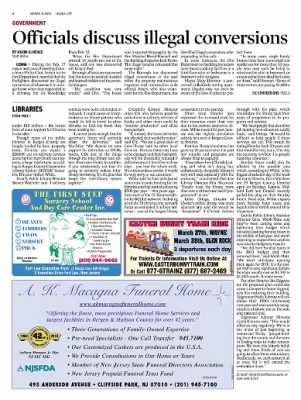Dating Law In Leonia Nj
“He pops up everywhere I go; I am going to take out a restraining order against him for harassing me;” “she is calling me non-stop; I’m going to take out a restraining order against her.”
Dating Law In Leonia Nj Borough
I hear these phrases all too often, from clients, from friends, and even from people on the street. They want to take out restraining orders against friends turned enemies, casual encounters turned habitual stalkers, and lovers now scorned and bitter. Often people are dismayed, however, to hear that in New Jersey, you simply cannot take out a restraining order against just anyone. Specifically, the New Jersey Prevention of Domestic Violence Act, enacted by the Legislature in 1991, only allows the issuance of a restraining order where a person, regardless of gender, has been subjected to domestic violence by a spouse, former spouse, or any other person who is a present or former household member. Also included is any person, who has been subjected to domestic violence by a person with whom the victim has a child, or with whom the victim anticipates having a child, if one of the parties is pregnant as well as a person with whom the victim has had a dating relationship.


Dating Law In Leonia Nj
- Find the best consumer attorney serving Leonia. Compare top New Jersey lawyers' fees, client reviews, lawyer rating, case results, education, awards, publications, social media and work history. Last Updated January, 2021.
- In New Jersey, for example, the general age of consent is 16. However, a young adult between the age of 16 and 18 cannot give consent to engaging in sexual intercourse with someone who has supervisory or disciplinary power over the young person.
- Find local Singles groups in Leonia, New Jersey and meet people who share your interests. Join a group and attend online or in person events.
With regard to the “dating relationship” requirement, and indeed, generally, the Act has been construed very broadly in accordance with the Legislature’s overarching goal – namely, to protect victims against further acts of domestic violence. For instance, in J.S. v. J.F., A-2552-08, the Appellate Division held that a paid escort is a “date” under the Act. The Court elaborated upon its decision as follows:
Find top Leonia, NJ Family Law attorneys near you. Compare detailed profiles, including free consultation options, locations, contact information, awards and education.
'Experience suggests that most claims of a dating relationship turn on what the particular parties would view as a ‘date,’' wrote the Judge. 'Accordingly…courts should vigilantly guard against a slavish adherence to any formula that does not consider the parties’ own understanding of their relationship as colored by socio-economic and generational influences.'

While the above definition may reasonably lead to the conclusion that the definition of a “dating relationship” under the Act is boundless, recently, the Appellate Division came out with a decision to the contrary. Specifically, in last month’s decision of C.K. v. A.P., A-20-2-9851, the Appellate Division found that a “casual” relationship was not sufficient so as to constitute a “dating relationship” under the Act which would warrant the issuance of a Final Restraining Order. In C.K., the parties had a casual relationship from approximately November or December 2006, to approximately April and July 2006. At trial, C.K. testified she would 'hang out' with A.P. and chitchat. A.P. testified along the same lines – i.e., that the two never dated. He stated they only had a friendship that lasted four months. They had no sexual relationship and were not intimate. After almost two years passed from the end of their relationship, in 2008, A.P. made contact with C.K. (the Appellate Division did not state what the contact consisted of), which in turn caused C.K. to take out a Temporary Restraining Order against A.P.

Based upon the testimony and the facts adduced at trial, the trial judge entered the FRO, finding as follows:
[The parties] both agree they never went out on [a] date, so to speak. Didn’t go to a movie. Didn’t go to restaurants. Didn’t go out to eat. Didn’t visit each other’s family. Didn’t go to clubs, church, shopping together or any of those typical incidents of a dating relationship, but they were involved in a relationship of more than hi and bye friends.
A.P. appealed the trial court’s decision, alleging that the evidence failed to establish the parties had a dating relationship within the meaning of the Act. The Appellate Division agreed and reversed the trial court’s grant of a Final Restraining Order. In doing so, the Appellate Division examined a number of factors that led to their conclusion:

(1) Was there a minimal social interpersonal bonding of the parties over and above a mere casual fraternization?
(2) How long did the alleged dating activities continue prior to the acts of domestic violence alleged?
(3) What were the nature and frequency of the parties’ interactions?
(4) What were the parties’ ongoing expectations with respect to the relationship, either individually or jointly?
(5) Did the parties demonstrate an affirmation of their relationship before others by statement or conduct?
(6) Are there any other reasons unique to the case that support or detract from a finding that a 'dating relationship' exists?
Interestingly, the present case seems to be in conflict with the Appellate Division’s statements in the “escort case” (not quoted in C.K.), namely:
…while those guidelines are helpful, the principles underlying the Prevention of Domestic Violence Act 'would not be served by a cramped interpretation of what constitutes a dating relationship.'
While here it is undisputed that the two parties chit-chatted, never engaged in typical dating activities and never were intimate, it certainly seems as though both parties viewed themselves as “more than friends.” This must beg the question of whether the Court found determinative the fact that the parties were not sexually intimate. Interestingly, it seems that the Court views slightly “more than friends” as not a “dating relationship” as long as there is no sex involved, when, at the same time, paid sex is viewed as falling within the Act. We will keep you posted if and when the Court elaborates.